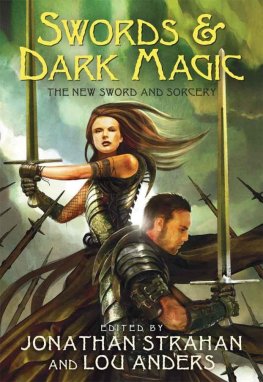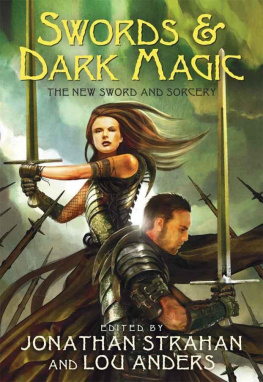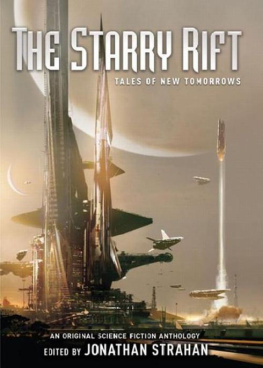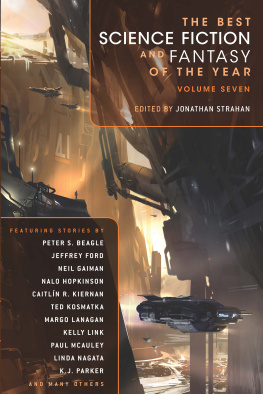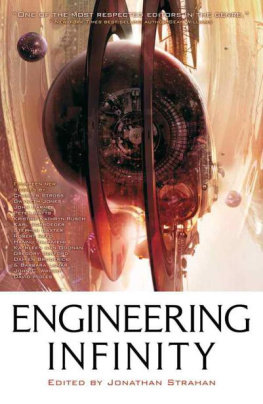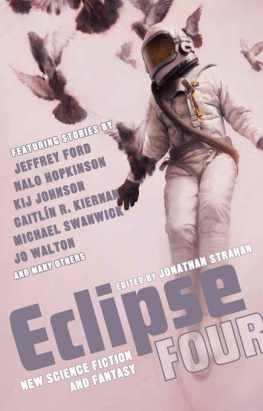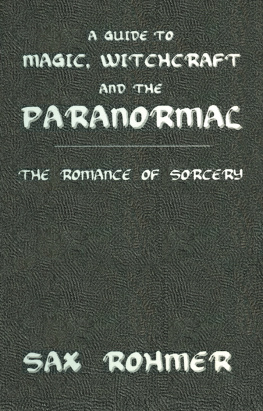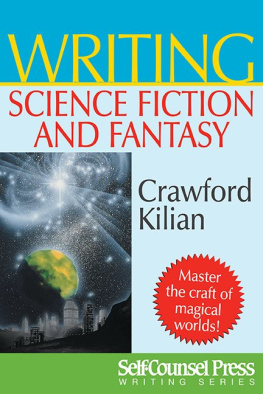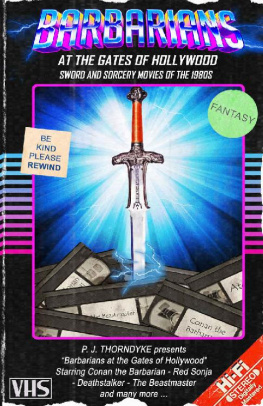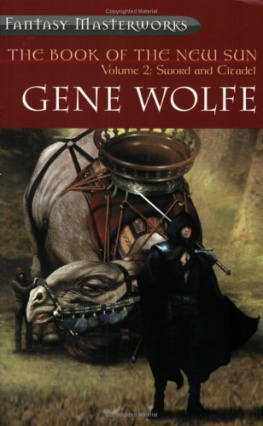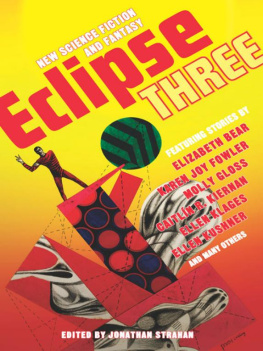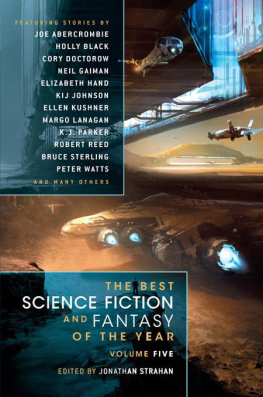Swords & Dark Magic
The New Sword and Sorcery
Edited by
Jonathan Strahan and Lou Anders
ROBERT E. HOWARD,FRITZ LEIBER,
andMICHAEL MOORCOCK,
the great literary swordsmen who made it possibleIntroduction
CHECK YOUR DARK LORD AT THE DOOR
Sword and sorcery. The name says it all. Action meets magic. If high fantasy is about vast armies divided along the lines of obvious good versus ultimate evil, epic struggles to vanquish dark lords bent on world domination, then sword and sorcery is its antithesis. Smaller-scale character pieces, often starring morally compromised protagonists, whose heroism involves little more than trying to save their own skins from a trap they themselves blundered into in search of spoils. Sword and sorcery is where fantasy fiction meets the western, with its emphasis on traveling swordsmen wandering into an exotic setting and finding themselves thrust into unanticipated conflicts there. As high fantasy concerns itself with warring nations and final battles, sword and sorcery focuses on personal battles, fought in the back alleys of exotic cities, in the secret chambers of strange temples, in the depths of dark dungeons. If high fantasy is a child of The Iliad, then sword and sorcery is a product of The Odyssey.
J. R. R. Tolkien is the undisputed father of high, or epic, fantasy. His Lord of the Rings drew on Norse mythologies, his personal experiences in World War I, and, arguably, Wagners The Ring of the Nibelung (though he denied this vehemently). The story of a titanic struggle for the fate of nations, it single-handedly led to the creation of the fantasy genre as a recognized genre, and spawned a thousand imitators. Famous names such as Terry Brooks, Terry Goodkind, Robert Jordan, Roger Zelazny, Stephen R. Donaldson all owe an immeasurable debt to the Oxford professor. But the earlier form of sword and sorcery fantasy owes its genesis to Texan-born Robert E. Howard, who drew upon his Irish ancestry and a lifetime of tall tales of the American West to create stories of adventure that were, in contrast to his contemporaries, laced with a grim pessimism and an edge of violent realism. A boxer who stood six feet two inches, known for his stamina and for rarely losing a fight, Howard brought to his imagined conflicts a reality backed up by experience. It was in the pages of Weird Tales that he, a popular writer who wrote for scores of classic pulp magazines, would debut his greatest and most influential creation, Conan the Cimmerian. Like Tolkiens Middle Earth, Howard set Conans adventures in an imagined prehistoric land, Hyperborea, which existed between the fall of Atlantis and the time of recorded history. From out of the barbaric north, Conan came, a thief, a reaver, a slayer, with gigantic melancholies and gigantic mirth, to tread the jeweled thrones of the Earth under his sandalled feet. As he detailed Conans exploits, Howard pioneered a new kind of fantasy, one that owed as much to the swashbuckling tales of Alexandre Dumas and Rafael Sabatini as it did to the outlaws and renegades of the American West.
Like the gunslingers whose exaggerated exploits form the bedrock of Howards childhood entertainments, Conan was an opportunist, a self-serving fortune seeker with a fatalistic outlook, albeit a man loyal to his friends, often given to penetrating psychological insights. Between 1933 and his death in 1936, Howard placed eighteen stories of Conan in the pages of Weird Tales. An instant success, the characters most immediate influences were writers C. L. Moore and Fritz Leiber. The former introduced Jirel of Joiry in 1934, the year after Conans debut. Notable for being the first female protagonist in sword and sorcery, Jirel was the monarch of an imagined medieval French province, known for relying on her wits over her fists, albeit not shy of taking up a sword and shield. Moore penned six tales between 1934 and 1939, beginning with the classic Black Gods Kiss.
Furthermore, Howards contemporary Clark Ashton Smith is notable for his own contribution to the genre, not the least of which were his own Hyperborean tales, set, like Howards, in a lost mythical age. In this case, though, his Hyperborea was an Arctic continent, the last gasps of a civilization facing the encroachment of an Ice Age. By peopling them with sorcerers and strange deities, Smith seemed to merge the worlds of Robert E. Howard with that of the third great writer from this era of Weird Tales, their friend H. P. Lovecraft.
Come the 1960s, however, the sword and sorcery genre, with the exception of Leibers Fafhrd and Gray Mouser tales, had waned in popularity, until writer Lin Carter crafted the first successful ongoing series in imitation of Howards Conan. Carters Thongor series, beginning with The Wizard of Lemuria in 1965, blended Howards barbarian with the works of Edgar Rice Burroughs. Set across the lost continent of Lemuria, they featured magic, flying machines, and mankinds attempts to throw off the shackles of a serpentine race of Dragon Kings. Carters Thongor tales diminished, however, when he was recruited by L. Sprague de Camp to assist in a Conan revival.
De Camp had contributed his own notable sword and sorcery in the 1950s. His Pusadian series was an attempt to write in a Hyperborean setting that paid more attention to what was then known about the geology of the earth. But beginning in the 1950s, though primarily in the 1960s, de Camp began to work to republish the existing Conan tales, as well as to publish the many Howard-penned Conan stories unpublished in the authors lifetime. In the aforementioned collaboration with Lin Carter, he worked to popularize Howard and bring him back into print. Adding their own contributions to the mythos, de Camp and Carter rewrote many of Howards unpublished non-Conan tales as new exploits of the Cimmerian. This led to a boom in Conans popularity, with the character spilling out into new novels, comic books, and even film, though a 1983 biography of Howard, penned by de Camp and titled Dark Valley Destiny: the Life of Robert E. Howard, had the unintended consequence of refocusing attention on Howards undiluted Conan, with de Camp and Carters additions and alterations dwindling in public favor.
Sword and sorcery wouldnt officially be labeled as its own subgenre until 1961, however, when Michael Moorcock published a letter in the fanzine Amra, demanding that the type of swashbuckling adventure story pioneered by Howard be given a name. Ironically, Moorcock originally proposed the term epic fantasy, a label that has since come to be applied to the other side of the coin, that of J. R. R. Tolkien and his successors. But Fritz Leiber christened the subgenre when he wrote in the July 1961 issue of Amra, I feel more certain than ever that this field should be called the sword-and-sorcery story. This accurately describes the points of culture-level and supernatural element and also immediately distinguishes it from the cloak-and-sword (historical adventure) storyand (quite incidentally) from the cloak-and-dagger (international espionage) story too!
In this same year, Moorcock would pen The Dreaming City, the first tale of his antihero Elric of Melnibon, arguably the only sword and sorcery protagonist to reach Howards level of influence. Conceived as an anti-Conanor, rather, Conan as an angst-ridden teenagerElric was a sickly, drug-taking albino who relied upon an evil, soul-sucking black sword to feed him the stolen energies to both maintain his life and increase his vitality. Simply put, Moorcocks contribution to fantasy literature cannot be overstated. The New Wave movement that he later pioneered forever changed the face of science fiction, just as his concept of the multiverse would as well, even spilling out of the pages of imaginary tales to grace the lips of our contemporary physicists, but for our purposes here, it might be his alteration of the battle of Good versus Evil into that of Law versus Chaos (with disastrous consequences implied if either side ultimately triumphed over the other) that made the most significant contribution to fantasy literature. His heroes, whether Elric of Melnibon, or Dorian Hawkmoon, or the rock and roll assassin Jerry Cornelius, were all manifestations of the Eternal Champion, a soul doomed to forever maintain the Cosmic Balance by lending weight to one side of the scales or the other. Moorcocks influence is colossal, his shadow cast everywhere from role-playing games (and thus, subsequently, all third-person computer and console gaming) to rock and roll to literature. The alignment wheel of Dungeons & Dragons is nothing short of his Law vs. Chaos and Good vs. Evil plotted on an X-Y axis, and it is no surprise that Michael Chabons foray into fantastical swashbuckling,

